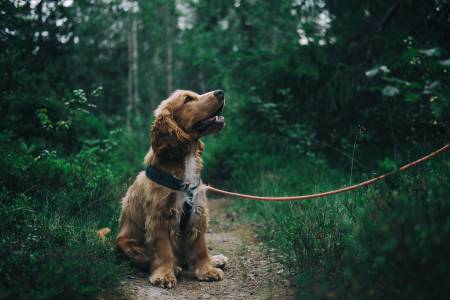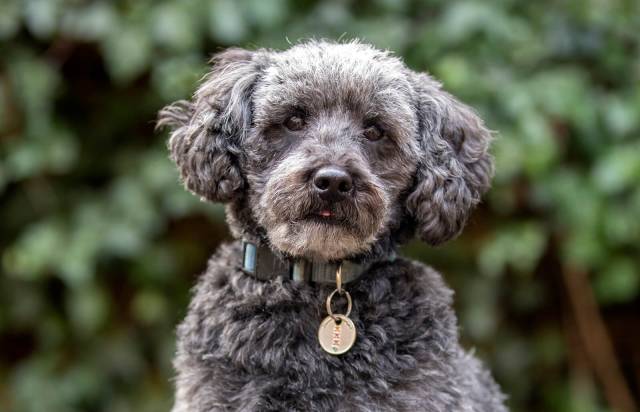Does your dog sometimes suffer from bouts of diarrhea? As a pet parent, it can be pretty upsetting to see your fur baby having this type of trouble. It is a fairly common problem in dogs, too, especially since they are frequently drawn to eating anything that appeals to them! Some pet parents say their dogs have a “garbage gut,” because of their tendency to eat anything and everything.
Connect with a verified veterinarian in minutes. Licensed vets are available 24/7 to answer your questions. No need to worry about your furry family member.
While most instances of diarrhea last a short time and don’t seem to affect your fur baby too much, there are other times when diarrhea can be a life threatening condition, or it may be the sign of a much more serious medical condition.
What is Diarrhea?
OK—before getting on with what diarrhea is, we must warn you the following may be a little gross. We’ll try to keep it all from going too far downhill. Here goes!
Diarrhea is poo that is either unformed or “loose,” meaning that this is poo that on the liquid side. In fact, diarrhea can be in larger amounts that normal and may occur more often, too. This is not an illness in itself but is a sign that something is making your dog sick. Whatever the cause, your dog’s gut is having a problem.
Diarrhea may be a simple case if it only lasts a short time and resolves quickly. On the other hand, this medical condition can be serious and even life-threatening.
What Causes Diarrhea in Dogs?
Diarrhea can be caused by any number of things including:
Eating too much grass: can cause stomach upset, vomiting and diarrhea
Dietary indiscretion: dogs are known for what is called dietary indiscretion. All this means is that our fur babies are prone to sometimes eating too much, eating trash, spoiled foods, dead things, etc. Vets even have a name term for this condition—it’s called “garbage toxicosis” or “garbage gut.”
Food intolerance/food allergies: this is caused when your dog eats food that he’s allergic to. Most dogs seem to be able to eat just about anything, but there are others that do have food intolerance and food allergies, just like us.
Parasites: this is a common cause of diarrhea in both adult dogs and puppies. Parasites that can cause diarrhea in dogs include:
- Giardia
- Whipworms
- Roundworms
- Hookworms
- Coccidia
Toxins: can include anything that is poisonous such as household chemicals, chocolate, other substances and even plants
Swallowing a foreign object: if a dog swallows a foreign object, he could develop diarrhea. This could include almost anything such as a toy, one or more socks, etc. This can be a sign that your fur baby may have an intestinal blockage, which is a life-threatening medical emergency.
Viral infections: can also cause diarrhea in dogs. The most common include:
- Parvovirus
- Canine coronavirus
- Distemper
Bacterial infections: including salmonella and E. coli
Medications: including antibiotics and others
Stress, or emotional upset: such as certain types of anxiety, etc.
As you can see, there are many things that can cause a dog to develop diarrhea. Most cases of diarrhea will clear up on their own in about 24 hours or so. However, some diarrhea may last longer or be more serious. The symptoms of serious diarrhea include:
- Blood in the feces
- Fever
- Abdominal pain
- Loss of appetite
- Lethargy
- Dehydration
- Weakness
Diarrhea can be life-threatening, as it can cause dehydration. These symptoms may also indicate a serious health issue such as parvovirus, which is life-threatening.

Review symptoms, medications & behavior to keep your pets healthy with a Vet Online in just minutes.
Ask a Vet Live NowChronic Diarrhea in Dogs
Diarrhea can be acute (which means it suddenly appears) or chronic. Chronic diarrhea can be caused by food allergies/intolerance, stress, parasites, bacterial infections, pancreatic disease, some types of cancer and more. These are all very serious health issues. If your canine companion has chronic diarrhea, then it’s time to call the vet to determine the cause and the right treatment.
Other Things to Consider If Your Dog Has Diarrhea
If your fur baby is having diarrhea and is very young or old, or has a pre-existing health condition, then you’ll need to call the vet right away. Diarrhea can be extremely debilitating for these dogs. It will also be necessary to call the vet if your fur baby’s diarrhea is frequent and/or watery, contains blood, and is tarry and dark.
If your dog is having the following symptoms in addition to diarrhea, then you’ll need to call the vet:
- Lethargy
- Vomiting (large amounts)
- Seems to be in pain
- Depressed
On the other hand, if your canine companion isn’t having these issues and is otherwise healthy, then you may be able to try some at-home remedies. OK, we’re now done with the gross parts of this article, and can now proceed on to some home remedies if your fur baby is having uncomplicated diarrhea.
Dog Diarrhea Home Remedy
What is the best food for dog with diarrhea? That’s a good question! Read on for some answers! You can try these remedies that you may already have in the pantry!
- Rice water: you can make this from plain white rice. Cook the rice with a lot of water. When it’s finished, drain out the rice water and then gives this to your dog. You can even add a little bit of baby food or broth if your dog doesn’t want to eat this plain.
- Canned pumpkin: we’re not talking about canned pumpkin pie filling. The reason? It contains ingredients, such as cinnamon, that are toxic to dogs. Plain canned pumpkin, on other hand, is safe for your fur baby. Just let him eat a bit of this and it may slow down or end the diarrhea.
- Boiled potatoes: just boil the potatoes as you would normally, then allow them to cool. Also make sure to remove the skins, as these could make the diarrhea worse.
You can also try these remedies sold over the counter for doggie diarrhea:
Vets Preferred Advanced Anti-Diarrhea Liquid: this liquid can work quickly to ease your fur baby’s diarrhea and upset stomach. It even contains a substance that detoxifies bacterial toxins.
Zesty Paws Probiotic Bites: these all-natural bites include probiotics and pumpkin that work to soothe diarrhea and stomach upset, and even offers gas & constipation relief.
Nummy Tum Tum Pure Pumpkin for Pets: this organic product contains pumpkin and sweet potato to help ease stomach upsets and diarrhea in dogs. Because this is made especially for dogs, you don’t have to worry about the pumpkin containing toxic ingredients that could make your dog’s diarrhea worse.
Treating Diarrhea at Home
If your fur baby only has mild diarrhea, with no other symptoms, you can treat his diarrhea this way:
1). Be sure your canine companion has plenty of clean water to drink. This will help him avoid dehydration. If he doesn’t seem to want the water, you can try adding some low-sodium beef or chicken broth to the water.
2). Give him one of the home remedies listed in the previous section. You can also try to give him some boiled white chicken, without the bones or skin. Puree the meat so it’s easier to digest, but then add it to some white rice, sweet potato or pumpkin (instead of the rice). Serve this to your dog at each meal until his diarrhea stops and his poo is back to normal.
3). If your fur baby’s diarrhea lasts longer than 24 hours, or if his diarrhea gets worse, then it’s time to call the vet.
Diagnosis & Treatment of Diarrhea
When you get to the vet, they will ask you how long your dog has had the diarrhea, and will ask about any other symptoms you’ve noticed. Then the vet will examine your fur baby and check for abdominal pain or swelling and more. The vet may also order some other tests including blood tests and a fecal exam. The fecal exam is easy and the vet will look at the sample under a microscope. In some instances where the diarrhea is not easily diagnosed, it may also be necessary for your fur baby to have x-rays or an ultrasound, endoscopy or even exploratory surgery. These are done to check your canine companion’s digestive tract, look for foreign objects or other health issues.
Treatment will depend on what the vet determines to be the cause of the diarrhea. For instance, if worms are the problem, your fur baby will be prescribed deworming medication to kill and him of the parasites. A couple of examples of dewormers include Panacur and Drontal. If after treatment your dog still has diarrhea, then he may need to stay in the hospital for a few days. While he’s there, the vet may treat your canine companion with medications, IV liquids to help hydrate your dog, etc. Again, if your fur baby doesn’t improve, then the vet may need to try different medications.
In most cases, the prognosis is very good for dogs being treated for diarrhea, depending on the cause and the severity of the diarrhea. Most cases that are just simple diarrhea will last a short time, and your fur baby should go on his happy way when he feels better.
How to Avoid Your Dog Developing Diarrhea
There are some ways you can keep your fur baby from developing diarrhea. These include:
- Don’t give your dog bones—instead give him proper chew toys that don’t fall apart.
- Do not change your dog’s diet all of a sudden.
- Keep small objects away from your dog.
- Do not feed him table scraps.
- Keep all trash cans and waste baskets covered, to make it more difficult for your dog to get inside for some “yummy” treats.
- Take your dog for regular vet visits and make sure your fur baby is dewormed and has his required shots.
Not all diarrhea is dogs is preventable but taking these steps may lessen the chances your dog could develop diarrhea. We hope you and your fur baby are both healthy and happy, and that if he does have diarrhea, he has a quick and full recovery!
Connect with a verified veterinarian in minutes. Licensed vets are available 24/7 to answer your questions. No need to worry about your furry family member.

Kim
Kim is a talented author, who loves animals especially dogs. She engaged in writing books and articles relating to animals a decade ago. Kim resides in Chicago with her husband and son. The family is the proud owner of a dog and a parrot (Jack and Lily). Kim wanted more than these two pets, but her husband put his foot down... She often visits elementary schools to talk to the kids about what she learned about pets and how they could learn from them.
Review symptoms, medications & behavior to keep your pets healthy with a Vet Online in just minutes.
Ask a Vet Live Now



